An environmental group found 13 contaminants in the Corpus Christi’s tap water, saying 10 are linked to cancer. City officials responded.
CORPUS CHRISTI, Texas — Update: On Friday afternoon, the City of Corpus Christi releasesd an official statement in response to this story:
“In response to recent media reports regarding potential carcinogens in the treated water provided by Corpus Christi Water (CCW), the City would like to provide factual clarification.
Information on an environmental organization’s website creates the impression that chemicals utilized in the disinfection process pose a cancer risk. The organization uses self-determined “health-based standards”, not the Environmental Protection Agency (EPA) or the Texas Commission on Environmental Quality (TCEQ) standards, to make assertions regarding the overall water quality within a particular city. Additionally, this group promotes the purchase of water filtration equipment and states on its website that the organization “earns commission from qualifying purchases to support its mission.”
The water provided by CCW undergoes daily testing and treatment, meeting all regulatory requirements established by the EPA and the TCEQ. These established federal and state drinking water standards are based on scientific review and regulatory oversight. CCW meets and exceeds these standards and is rated as a Superior Water System by the State of Texas. Of the 7,340 water systems within the state, 9.7% are rated as Superior, demonstrating CCW’s delivery of high-quality drinking water.
CCW is required to publish an annual Water Quality Report that follows EPA and TCEQ standards which provides extensive data regarding the water supplied to customers. This report can be found online at corpuschristitx.gov under the CCW page, following the link to water quality reports.
CCW strives to fulfill the mission of providing the highest-quality water and wastewater services that exceed regulatory requirements and serve the region.”
Original story:
A new report is raising questions about what’s really coming out of the tap in Corpus Christi.
RELATED: New project tackles decades of water quality and pollution concerns in Baffin Bay
The nonprofit Environmental Working Group analyzed local water data from the Texas Commission on Environmental Quality and the U.S. Environmental Protection Agency. Their findings: 13 contaminants were detected in the city’s drinking water, with 10 of them linked to cancer.
Sydney Evans, a senior science analyst with the group, said the concern isn’t about immediate illness, but long-term health effects.
“We are looking at long-term trends,” Evans said. “If you’re drinking this water over a lifetime, how is it affecting your risk for these health effects? We’re not looking at what might make people sick tomorrow.”
Evans added that most of the cancer-causing agents are byproducts of the disinfectants used to keep water systems free from dangerous pathogens.
City leaders say they’re taking the report seriously.
Councilman Roland Barrera told 3NEWS he plans to review the findings with staff to see what changes may be needed. Councilman Mark Scott noted that while the data isn’t in dispute, the city must follow state and federal guidelines.
Scott also pointed out that Corpus Christi’s water system holds a “superior” rating from regulators.
But environmental advocates say there’s a balancing act.
The Strategic Business Manager for Corpus Christi Water, Ashley Marion issued the following statement:
The City of Corpus Christi’s water undergoes daily testing and treatment meeting all Environmental Protection Agency and Texas Commission on Environmental Quality requirements. We follow established federal and state drinking water standards that are based on scientific review and regulatory oversight. We take our responsibility to deliver safe drinking water seriously, which is why Corpus Christi maintains a superior-rated public water system as designated by TCEQ. Corpus Christi Water provides an annual water quality report to the public detailing its testing results for numerous regulated contaminants.
Jason Hale with the Sierra Club’s Corpus Christi chapter explained, “We want to get rid of the pathogens, right? But we also want to make sure we are not creating too many disinfectant byproducts because of those health risks.”
The Environmental Working Group recommends residents consider using an at-home filtration system, like one that you could put on your faucet or even a filtered water pitcher, to reduce exposure to the contaminants.
For now, the city maintains its water meets all legal safety standards, but this latest report is a reminder that what’s considered “safe” today may still carry long-term risks.

